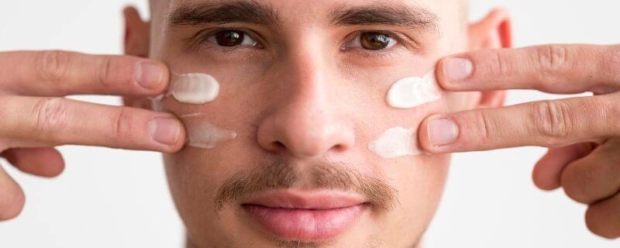Skin creams have evolved over millennia, starting with ancient civilizations like the Egyptians and Greeks who used natural ingredients. The Renaissance spurred scientific inquiry, leading to innovations in skincare. The 19th-century industrial revolution brought mass production and distribution. By the mid-20th century, dermatological advancements fueled specialized products targeting specific concerns. Recent decades have witnessed a blend of science, tradition, and technology, with a focus on natural and sustainable ingredients. Today, skincare products offer a wide range of solutions, combining research, tradition, and innovation to cater to diverse needs while emphasizing safety and efficacy.
The skincare industry offers a plethora of products, regimes, and tailored solutions for various skin types and concerns. Social media influencers amplify product recommendations, inundating consumers with choices. Navigating this landscape requires understanding one’s skin needs and critically evaluating recommendations amid the noise of social media.
Here are ten steps to help you select what’s best for you:
- Know Your Skin Type: Determine whether your skin is dry, oily, combination, or sensitive. This helps narrow down suitable products.
- Identify Your Concerns: Pinpoint specific skincare concerns such as acne, aging, pigmentation, or sensitivity to target the right products.
- Research Ingredients: Understand key ingredients like retinol, hyaluronic acid, and vitamin C, and how they address different skin issues.
- Read Reviews Wisely: Look for reviews from trusted sources or experts rather than relying solely on influencers or social media.
- Patch Test: Before fully incorporating a new product, patch it on a small area of your skin to check for any adverse reactions.
- Consult a Dermatologist: For personalized advice, especially if you have specific skin conditions or concerns, consult a dermatologist.
- Simplify Your Routine: Avoid using too many products at once. Stick to a simple routine with cleanser, moisturizer, and sunscreen before adding additional treatments.
- Check for Compatibility: Ensure the products you use are compatible with each other and won’t counteract or irritate your skin.
- Give Products Time: Allow products at least a few weeks to show results before deciding whether they’re effective for you.
- Listen to Your Skin: Pay attention to how your skin responds to products. If something causes irritation or doesn’t seem to work, discontinue use and try something else.
There are five primary types of skin:
- Normal skin: Balanced skin with few imperfections, not too oily or dry.
- Oily skin: Skin that produces excess sebum, often appearing shiny and prone to acne.
- Dry skin: Skin lacking moisture, often feeling tight or flaky.
- Combination skin: Skin with both oily and dry areas, usually oily in the T-zone and dry on the cheeks.
- Sensitive skin: Skin prone to irritation, redness, or reactions to certain products or environmental factors.
Here’s a basic skincare routine with product recommendations tailored to each skin type:
Normal Skin:
- Cleanser: Gentle, non-irritating cleanser.
- Toner: Mild, alcohol-free toner.
- Moisturizer: Lightweight, non-greasy moisturizer.
- Sunscreen: Broad-spectrum SPF 30 or higher.
Oily Skin:
- Cleanser: Foaming or gel-based cleanser with salicylic acid.
- Toner: Astringent or mattifying toner.
- Moisturizer: Oil-free, non-comedogenic moisturizer.
- Sunscreen: Oil-free, non-comedogenic sunscreen.
Dry Skin:
- Cleanser: Creamy, hydrating cleanser.
- Toner: Hydrating or soothing toner.
- Moisturizer: Rich, emollient moisturizer.
- Sunscreen: Moisturizing sunscreen with added hydration.
Combination Skin:
- Cleanser: Balancing cleanser suitable for all skin types.
- Toner: Balancing toner to control oil and hydrate dry areas.
- Moisturizer: Lightweight, oil-free moisturizer with hydrating ingredients.
- Sunscreen: Lightweight, non-greasy sunscreen suitable for all skin types.
Sensitive Skin:
- Cleanser: Fragrance-free, gentle cleanser.
- Toner: Alcohol-free, soothing toner with calming ingredients.
- Moisturizer: Hypoallergenic, fragrance-free moisturizer.
- Sunscreen: Mineral-based, fragrance-free sunscreen formulated for sensitive skin.
Skincare routines differ between morning and night to address the unique needs of the skin at different times of the day. In the morning, the focus is on protecting the skin from environmental stressors and providing hydration for the day ahead. Conversely, nighttime skincare aims to repair and rejuvenate the skin as it undergoes its natural renewal process during sleep. Specific products are necessary for each routine to maximize efficacy and address distinct concerns.
Morning Routine:
- Environmental Protection: Shielding the skin from UV rays, pollution, and other environmental aggressors is crucial to prevent damage and premature aging.
- Hydration: Providing the skin with lightweight moisture helps maintain hydration levels throughout the day, keeping the skin supple and comfortable.
- Prep for Makeup: A well-prepped canvas ensures smoother makeup application and longevity, making cleansing and moisturizing essential steps before makeup application.
- Daytime Treatments: Incorporating serums or treatments with antioxidant properties can help combat free radical damage and boost skin radiance throughout the day.
Night Routine:
- Repair and Renewal: The skin undergoes natural repair processes during sleep, making nighttime an ideal time to use products that support cell turnover and collagen production.
- Makeup Removal: Thoroughly removing makeup, dirt, and pollutants accumulated during the day is essential to prevent clogged pores and skin irritation.
- Deep Hydration: Richer moisturizers or overnight masks provide intensive hydration and nourishment to replenish the skin’s moisture barrier while you sleep.
- Targeted Treatments: Active ingredients like retinoids, peptides, or acne treatments can penetrate deeply into the skin overnight to address specific concerns such as wrinkles, fine lines, or blemishes.
- Eye Care: Using an eye cream formulated to target dark circles, puffiness, or fine lines helps rejuvenate the delicate skin around the eyes for a refreshed appearance in the morning.
In conclusion, selecting the right skin cream involves careful consideration of its ingredients to ensure it effectively addresses your skincare needs. Essential ingredients like hyaluronic acid for hydration, retinoids for anti-aging, and antioxidants for protection are crucial elements to look for in a skin cream.
Understanding your skin type and concerns is key to choosing the most suitable products. By prioritizing ingredients that target your specific needs, you can enhance the health and appearance of your skin, achieving a radiant complexion you’ll love. So, the next time you’re in search of a skin cream, remember to check for these essential ingredients to make the most informed choice for your skincare regimen.


